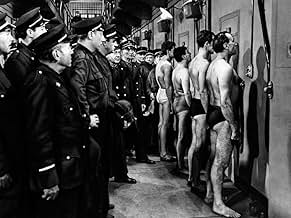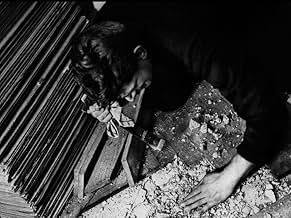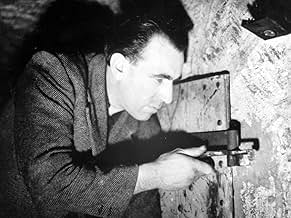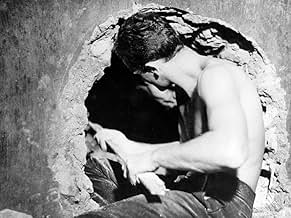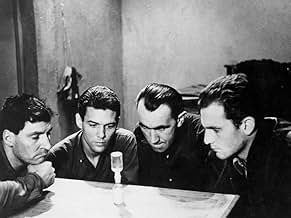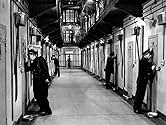AVALIAÇÃO DA IMDb
8,5/10
22 mil
SUA AVALIAÇÃO
Na prisão, quatro presidiários com penas longas planejando uma fuga elaborada induzem cautelosamente um novo preso a aderir a seu plano, criando desconfiança e incerteza.Na prisão, quatro presidiários com penas longas planejando uma fuga elaborada induzem cautelosamente um novo preso a aderir a seu plano, criando desconfiança e incerteza.Na prisão, quatro presidiários com penas longas planejando uma fuga elaborada induzem cautelosamente um novo preso a aderir a seu plano, criando desconfiança e incerteza.
- Direção
- Roteiristas
- Artistas
- Indicado para 2 prêmios BAFTA
- 2 vitórias e 4 indicações no total
Marc Michel
- Claude Gaspard
- (as Mark Michel)
Jean-Paul Coquelin
- Le lieutenant Grinval
- (as J. Paul Coquelin)
Albert Augier
- Un gardien
- (não creditado)
Jean Becker
- Un gardien
- (não creditado)
Mick Besson
- Deuxième plombier
- (não creditado)
Georges Bielec
- Figurant
- (não creditado)
Raymond Bour
- Un gardien
- (não creditado)
Philippe Dumat
- Un gardien
- (não creditado)
Gérard Hernandez
- Le détenu à l'infirmerie
- (não creditado)
Jean Luisi
- Un détenu
- (não creditado)
Avaliações em destaque
Jacques Becker's "Le Trou" is one of the greatest of all prison-break films. No film lover should miss it. It is every bit as masterful and tense as other milestones of this subgenre, including John Sturges' "The Great Escape," Robert Bresson's masterpiece "A Man Escaped," and Don Siegel's "Escape from Alcatraz." The meticulous preparation for the escape is a nail-biter, with many adrenaline-inducing close calls. The ringer: Will the newly exonerated prisoner stay with the group and escape or rat on the others? Those seeking pure entertainment or those seeking existentialist philosophical fare will be equally pleased. A memorable movie experience.
10palmiro
This film is riveting in its attention to the details of a prison escape and to the relations between the men involved. And even if you're not interested in the Marxist vision that inspires Becker in this last film of his, you will still be captivated by the story. In any case, to understand Becker's vision, I will necessarily have to give away the story so beware (and my analysis also makes the film sound much more schematic and polemical than it will appear to you on viewing it):
***SPOILER***
At the beginning of the film one of actors (clearly a car mechanic) approaches the camera and tells us that we are about to see a true story, his story. We are led to believe that it is the story of an escape from prison, and indeed we are taken to Paris' largest prison where a group of 4 cellmates, already plotting their escape, finds that they are unexpectedly joined by a new cellmate: a well-dressed (all prisoners wear their street clothes), somewhat effete, young man who nominally sells cars at (presumably) his father-in-law's dealership--in any case, it's clear that he doesn't really have to work or at least work hard for a living. On the other hand, the other four are clearly working-class guys who've drawn a bad card in life. After debating among themselves whether to let the pretty boy in on their plot, they decide to do so after they learn that he's in for attempted murder and stands to have a strong reason to want to break out.
Becker shows the extraordinary ingenuity of the working-class prisoners in contriving tools, in developing a postal system between cells, and in setting up a way of telling time where there are no clocks or church bells. The implication is: we, the working class, have the minds, the manual dexterity, and the willingness to work and to build our own civilization (minus the bourgeoisie). Meanwhile, the bourgeois type is astonished at how the working-class types are able to organize and think for themselves ('I've never met men like you before')- -and, above all, he is moved by their willingness to share their victuals and their plans for freedom with him. And it is just this solidarity and mutual support which Becker believes represents an alternative way to organize human society--an alternative to the self-centered world of the bourgeois. Note, for example, the character of 'Joe' who opts to not join in the escape because the police would harass his mother to death, but who still does not rat on the others even though it's clear he will have to do additional time and time in solitary after the breakout. Becker has a nice touch as well in the way he portrays the prison guards, also from the working-class: generally friendly towards the 'boys' in prison, with perhaps an authoritarian streak in them but no suggestion of a sadistic, brutish nature. So when 'Roland' says, 'Poor Gaspard,' after the latter has betrayed them (it was clear that he'd been tempted earlier to do so when he saw the taxi from the manhole cover), it is evident that the only real 'brute' is the bourgeois, who, in the end, will always turn on his pals (and his fellow man in general)if it serves his interest and who is bereft of the fellow-feeling which undergirds working-class life. So what about the claim that this is a true story? The actor who plays 'Roland' is a non-professional, but it's hard to imagine that he could be as young as he is if he had actually attempted 3 previous escapes and had to serve another long stretch for the failed attempt portrayed in the film. Instead, it's the 'true story' of the working class: a class dominated by the bourgeoisie but which resists and has the capability to guide itself without the bourgeoisie; a class which embodies the values of solidarity and the dignity of work--values which can become the foundation of an alternative civilization.
***SPOILER***
At the beginning of the film one of actors (clearly a car mechanic) approaches the camera and tells us that we are about to see a true story, his story. We are led to believe that it is the story of an escape from prison, and indeed we are taken to Paris' largest prison where a group of 4 cellmates, already plotting their escape, finds that they are unexpectedly joined by a new cellmate: a well-dressed (all prisoners wear their street clothes), somewhat effete, young man who nominally sells cars at (presumably) his father-in-law's dealership--in any case, it's clear that he doesn't really have to work or at least work hard for a living. On the other hand, the other four are clearly working-class guys who've drawn a bad card in life. After debating among themselves whether to let the pretty boy in on their plot, they decide to do so after they learn that he's in for attempted murder and stands to have a strong reason to want to break out.
Becker shows the extraordinary ingenuity of the working-class prisoners in contriving tools, in developing a postal system between cells, and in setting up a way of telling time where there are no clocks or church bells. The implication is: we, the working class, have the minds, the manual dexterity, and the willingness to work and to build our own civilization (minus the bourgeoisie). Meanwhile, the bourgeois type is astonished at how the working-class types are able to organize and think for themselves ('I've never met men like you before')- -and, above all, he is moved by their willingness to share their victuals and their plans for freedom with him. And it is just this solidarity and mutual support which Becker believes represents an alternative way to organize human society--an alternative to the self-centered world of the bourgeois. Note, for example, the character of 'Joe' who opts to not join in the escape because the police would harass his mother to death, but who still does not rat on the others even though it's clear he will have to do additional time and time in solitary after the breakout. Becker has a nice touch as well in the way he portrays the prison guards, also from the working-class: generally friendly towards the 'boys' in prison, with perhaps an authoritarian streak in them but no suggestion of a sadistic, brutish nature. So when 'Roland' says, 'Poor Gaspard,' after the latter has betrayed them (it was clear that he'd been tempted earlier to do so when he saw the taxi from the manhole cover), it is evident that the only real 'brute' is the bourgeois, who, in the end, will always turn on his pals (and his fellow man in general)if it serves his interest and who is bereft of the fellow-feeling which undergirds working-class life. So what about the claim that this is a true story? The actor who plays 'Roland' is a non-professional, but it's hard to imagine that he could be as young as he is if he had actually attempted 3 previous escapes and had to serve another long stretch for the failed attempt portrayed in the film. Instead, it's the 'true story' of the working class: a class dominated by the bourgeoisie but which resists and has the capability to guide itself without the bourgeoisie; a class which embodies the values of solidarity and the dignity of work--values which can become the foundation of an alternative civilization.
10pzanardo
Probably, to really get "Le Trou", this splendid, intense movie, you have to be conscious that the great Jacques Becker was dying during the making of the film. A quiet stoicism permeates this work of art. The story is supposed to be very sad, but it isn't. The guys on the screen are too tough, by no means apt to mourn their dire destiny or, metaphorically, to ask for the viewer's sympathy.
We have the true story of the hole dug by a bunch of in-mates to escape from a jail in Paris. The screenplay is taken from a novel of the distinguished writer and film-maker Jose' Giovanni, himself formerly a convict. Becker chooses to tell the story in the simplest, neatest possible way. No music at all, an essential, dry, sharp yet powerful dialog. The in-mates do their job, to try to escape. The director avoids the annoying cliché, typical of the American jail-movies, of showing the wardens as sadistic torturers. They are tough and strict, they don't like but they feel no hate for the prisoners. The wardens just do their job, that's all. In fact, there are no really despicable characters in the film. At his last appointment with the art of cinema, Becker seems to accept and forgive all human beings.
A brilliant idea is to show how the guys turn common objects and waste iron into the tools needed for the escape (a key, a lamp, a pick, a sand-glass). The little periscope made with a tooth-brush gives raise to a shocking scene, few seconds of great cinema. We follow the in-mates' apparently endless, exhausting labor of digging and sewing. That should be rather boring for the viewer, but it isn't. How comes there's not a single moment of bore in the film? That's the privilege of Art.
The work of the camera and the black and white photography are sensational, and convey the intense emotions of the characters. The psychological study is made in such an understated way that you may overlook it at a first view. But, after seeing the movie a second time, and knowing the development of the story, you fully appreciate how the psychology of the characters is treated, with accuracy and depth. The actors make an excellent job. This is stunning, thinking that "Le Trou" was the first movie for Philippe Leroy and Michel Constantin, later prominent actors of French cinema. And Jean Keraudy wasn't a professional actor, he was one of the in-mates that actually dug the hole fourteen years earlier! (at least, this is stated by himself at the beginning of the movie, and is testified in several books on French cinema)
Are there deep messages in the film? Two wardens bring a fly to feed a spider. There is the spider, a patent symbol of death, ghastly in its immobility. Two prisoners are peeping and wondering: what the hell are the wardens doing? Got no idea. And who cares, after all? Maybe that is Becker's dry, ironic message. Don't be too deep. Fight against bad luck, be stoic and brave. Who cares, after all?
My opinion is that the artist Becker, displaying the same toughness of the guys on the screen, just fought to leave us a major work of art. Our task of viewers is to enjoy and love it. "Le Trou" is an unforgettable film, which honors the art of cinema.
We have the true story of the hole dug by a bunch of in-mates to escape from a jail in Paris. The screenplay is taken from a novel of the distinguished writer and film-maker Jose' Giovanni, himself formerly a convict. Becker chooses to tell the story in the simplest, neatest possible way. No music at all, an essential, dry, sharp yet powerful dialog. The in-mates do their job, to try to escape. The director avoids the annoying cliché, typical of the American jail-movies, of showing the wardens as sadistic torturers. They are tough and strict, they don't like but they feel no hate for the prisoners. The wardens just do their job, that's all. In fact, there are no really despicable characters in the film. At his last appointment with the art of cinema, Becker seems to accept and forgive all human beings.
A brilliant idea is to show how the guys turn common objects and waste iron into the tools needed for the escape (a key, a lamp, a pick, a sand-glass). The little periscope made with a tooth-brush gives raise to a shocking scene, few seconds of great cinema. We follow the in-mates' apparently endless, exhausting labor of digging and sewing. That should be rather boring for the viewer, but it isn't. How comes there's not a single moment of bore in the film? That's the privilege of Art.
The work of the camera and the black and white photography are sensational, and convey the intense emotions of the characters. The psychological study is made in such an understated way that you may overlook it at a first view. But, after seeing the movie a second time, and knowing the development of the story, you fully appreciate how the psychology of the characters is treated, with accuracy and depth. The actors make an excellent job. This is stunning, thinking that "Le Trou" was the first movie for Philippe Leroy and Michel Constantin, later prominent actors of French cinema. And Jean Keraudy wasn't a professional actor, he was one of the in-mates that actually dug the hole fourteen years earlier! (at least, this is stated by himself at the beginning of the movie, and is testified in several books on French cinema)
Are there deep messages in the film? Two wardens bring a fly to feed a spider. There is the spider, a patent symbol of death, ghastly in its immobility. Two prisoners are peeping and wondering: what the hell are the wardens doing? Got no idea. And who cares, after all? Maybe that is Becker's dry, ironic message. Don't be too deep. Fight against bad luck, be stoic and brave. Who cares, after all?
My opinion is that the artist Becker, displaying the same toughness of the guys on the screen, just fought to leave us a major work of art. Our task of viewers is to enjoy and love it. "Le Trou" is an unforgettable film, which honors the art of cinema.
Immediate background:Jacques Becker was dying when he filmed "le trou,and he made it his legacy;it's the tragedy of man caught on the web of life -an admirable metaphor shows two wardens feeding a spider in the undergrounds with a fly-,and anyway unable to escape from the final death.
The first thing to bear is mind is that,calling "le trou" a "prison movie" would be an insult.Although adapted from a Jose Giovanni's book -Giovanni had been himself in jail for some time and his depictions are as close to reality as can be-,Becker masterfully transcends his subject and gives something definitely new.Some said it was the final link between "la nouvelle vague" and what the highbrows pejoratively -and thoroughly unfairly- call "cinema de qualité" but Becker had predated that overrated new wave by almost ten years :"rendez-vous de juillet" had already almost everything the young Turks would bring later.
First shock is the use of the wide screen,the cinemascope,which Becker had never experimented before;and he achieved the impossible: using this device for a story which takes place ,either in the four walls of a jail,or in the undergrounds and the sewers .The only picture of the outside is seen when the two inmates open a manhole.And the second one is the sound:there's no music at all,except for the final cast and credits -saving the cast and credits for the end was very rare in the contemporary French cinema -But the soundtrack resembles some kind of musique concrete with its relentless thumps, the whispers and the screams inside the cell,the creaking of the doors ,the waters in the sewer;and the final cacophony -which is not unlike the one which Manliewicz used in "suddenly last Summer" the year before- packs a real wallop.
Another Becker's tour de force is his description of the prison life:he avoids all the clichés that mar so many "prison movies" (the overpraised "Whatsisname redemption" is no exception):here, the wardens are,most of the time ,kind and friendly,the relationships with the inmates remain polite ,maybe sometimes too much:particularly those between the young man (Marc Michel) and the head warden are almost paternalistic.
Another Becker's permanent feature comes back to the fore in "le trou" :friendship,solidarity ,which was already present in "rendez-vous de juillet" and "touchez pas au grisbi".Here it's pure manly friendship and it seems that a certain misogyny is infiltrating Becker's world:during the 2 hours + running time of the movie,we only see one young girl (Catherine Spaak) behind a grille,for a very short while.The only positive woman whom we' ll never see is (naturally) one of the five inmates ' s(Michel Constantin) mother("I almost killed her when I was sent to jail so I do not want to take a chance and try to escape")
SPOILER:But even this world where five inmates share everything,where their friendship is "more than I 've ever had "(Marc Michel's character) is collapsing;the first cracks were already here in "rendez-vous de juillet" when some of the young students were giving up on their plans ,to the main hero's (Daniel Gelin)disappointment.But "touchez pas au grisbi" took friendship over everything including money."Le trou" reveals the true nature of man,even if the informer seems completely desperate at the end of the movie.The mammoth task they did ,the hole '(le trou) is nothing but a cul-de -sac and it epitomizes,in a Hustonian way -we're closer to Huston than to Godard ,fortunately,the vanity of everything man can do to escape from his fate,and in the case of Becker ,to escape from death.END OF SPOILER
Had Becker ended his career with his three precedent movies (Ali-Baba,Arsène Lupin ,Montparnasse 19),his former masterpieces (Casque d'or,Goupi Main Rouges ,rendez-vous de juillet),could have been tarnished by association.But "Le trou" ,his final masterpiece stands in little danger of bringing this about.
The first thing to bear is mind is that,calling "le trou" a "prison movie" would be an insult.Although adapted from a Jose Giovanni's book -Giovanni had been himself in jail for some time and his depictions are as close to reality as can be-,Becker masterfully transcends his subject and gives something definitely new.Some said it was the final link between "la nouvelle vague" and what the highbrows pejoratively -and thoroughly unfairly- call "cinema de qualité" but Becker had predated that overrated new wave by almost ten years :"rendez-vous de juillet" had already almost everything the young Turks would bring later.
First shock is the use of the wide screen,the cinemascope,which Becker had never experimented before;and he achieved the impossible: using this device for a story which takes place ,either in the four walls of a jail,or in the undergrounds and the sewers .The only picture of the outside is seen when the two inmates open a manhole.And the second one is the sound:there's no music at all,except for the final cast and credits -saving the cast and credits for the end was very rare in the contemporary French cinema -But the soundtrack resembles some kind of musique concrete with its relentless thumps, the whispers and the screams inside the cell,the creaking of the doors ,the waters in the sewer;and the final cacophony -which is not unlike the one which Manliewicz used in "suddenly last Summer" the year before- packs a real wallop.
Another Becker's tour de force is his description of the prison life:he avoids all the clichés that mar so many "prison movies" (the overpraised "Whatsisname redemption" is no exception):here, the wardens are,most of the time ,kind and friendly,the relationships with the inmates remain polite ,maybe sometimes too much:particularly those between the young man (Marc Michel) and the head warden are almost paternalistic.
Another Becker's permanent feature comes back to the fore in "le trou" :friendship,solidarity ,which was already present in "rendez-vous de juillet" and "touchez pas au grisbi".Here it's pure manly friendship and it seems that a certain misogyny is infiltrating Becker's world:during the 2 hours + running time of the movie,we only see one young girl (Catherine Spaak) behind a grille,for a very short while.The only positive woman whom we' ll never see is (naturally) one of the five inmates ' s(Michel Constantin) mother("I almost killed her when I was sent to jail so I do not want to take a chance and try to escape")
SPOILER:But even this world where five inmates share everything,where their friendship is "more than I 've ever had "(Marc Michel's character) is collapsing;the first cracks were already here in "rendez-vous de juillet" when some of the young students were giving up on their plans ,to the main hero's (Daniel Gelin)disappointment.But "touchez pas au grisbi" took friendship over everything including money."Le trou" reveals the true nature of man,even if the informer seems completely desperate at the end of the movie.The mammoth task they did ,the hole '(le trou) is nothing but a cul-de -sac and it epitomizes,in a Hustonian way -we're closer to Huston than to Godard ,fortunately,the vanity of everything man can do to escape from his fate,and in the case of Becker ,to escape from death.END OF SPOILER
Had Becker ended his career with his three precedent movies (Ali-Baba,Arsène Lupin ,Montparnasse 19),his former masterpieces (Casque d'or,Goupi Main Rouges ,rendez-vous de juillet),could have been tarnished by association.But "Le trou" ,his final masterpiece stands in little danger of bringing this about.
Jacques Becker's swan song is a real gem of a film. Le Trou has such an amazing kinetic rhythm to it that one both feels and forgets the claustrophobic environs. Based on a real story turned into a novel by one of the "escapees", the film has excellent casting, wonderful (candel-lit!) cinematography and crisp dialog among its other advantages.
The director was terminally ill during the shoot and was to die after making the final cut. Watching this classic now some four decades since auteur's death, one can only wonder what an artist it would take to demand and achieve such breathtaking perfection in art while combating death at the same time.
Do not let yourself be put off by "yet another prison-movie!" talk. It is too good to be just that. So much so that it could merit comparison with Bresson's "A Man Escaped". A very deserving 10 out of 10.
The director was terminally ill during the shoot and was to die after making the final cut. Watching this classic now some four decades since auteur's death, one can only wonder what an artist it would take to demand and achieve such breathtaking perfection in art while combating death at the same time.
Do not let yourself be put off by "yet another prison-movie!" talk. It is too good to be just that. So much so that it could merit comparison with Bresson's "A Man Escaped". A very deserving 10 out of 10.
Você sabia?
- CuriosidadesThe scene where three different characters take turns breaking through the concrete floor of their cell is filmed in a single, nearly four minute long, shot.
- Erros de gravaçãoWhen Geo checks the corridor with the mirror and takes a break to say goodbye to his cellmates, he leaves the mirror in the hole. However, when he goes back to checking the corridor he has to stick the mirror back into the hole first.
- Citações
[last lines]
Roland Darban: [stripped, facing the wall under guard] Poor Gaspard.
- ConexõesFeatured in Mon père, il m'a sauvé la vie (2001)
Principais escolhas
Faça login para avaliar e ver a lista de recomendações personalizadas
- How long is The Hole?Fornecido pela Alexa
Detalhes
Bilheteria
- Faturamento bruto nos EUA e Canadá
- US$ 34.588
- Fim de semana de estreia nos EUA e Canadá
- US$ 6.756
- 2 de jul. de 2017
- Faturamento bruto mundial
- US$ 34.588
- Tempo de duração
- 2 h 11 min(131 min)
- Cor
- Proporção
- 1.66 : 1
Contribua para esta página
Sugerir uma alteração ou adicionar conteúdo ausente



